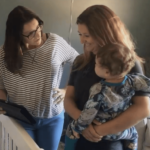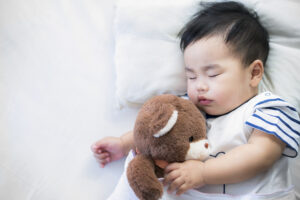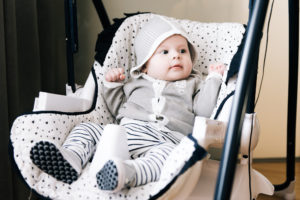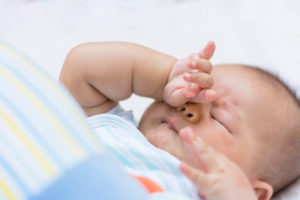When you buy through our links, we may earn a commission. Products or services may be offered by an affiliated entity. Learn more.
12-Month Sleep Regression
- Infants develop more consistent sleep patterns as they grow.
- Increased restlessness, separation anxiety, teething, and adjustments to their sleep schedule can contribute to a 12-month sleep regression.
- Signs of sleep regression include frequent wakings, difficulty getting back to sleep, agitation or crying, and taking longer naps during the day.
- 12-month sleep regression typically does not last longer than a few weeks.
- Encourage healthy habits and try different sleep strategies to improve your child’s sleep.
At a baby’s first birthday, parents and caregivers are often amazed by just how much their child has grown and developed. In addition to getting bigger, more active, and more responsive, many 12-month-olds have developed a more consistent sleep schedule. But sleep patterns for children at this age can still go through changes. Even babies who have started sleeping through the night may suddenly struggle to fall asleep or wake up frequently during the night.
When babies seem to take a step backward in their sleep routines, it is frequently referred to as a sleep regression. While sleep regressions can happen at many points, it is common for one to arise around the 12-month mark. Knowing what can provoke sleep regressions and how to cope with them can help parents and caregivers better support their child’s sleep.
How Does a Child’s Sleep Change Around 12 Months?
As an infant gets older, the trend in their sleep pattern is toward longer sleep periods. A greater proportion of their total sleep happens at night even though they continue napping during the day. Children who are 1 to 2 years of age should get 11 to 14 hours of total sleep each day, including naps.
Many babies start to sleep through the night at around 6 months of age, but this is far from universal. Sleep development in infants is highly variable , so many children’s sleep patterns do not follow that timeline. For example, one study found that 72% of 12-month-olds slept for six or more hours consecutively at night . As a result, while parents should expect to see a trend toward more and longer nighttime sleep, many will have different experiences.
Of course, these sleep fluctuations occur alongside a tremendous change in other aspects of development . As they near 12 months of age, children tend to show greater emotional engagement, increased communication, heightened cognitive skills, and expanded physical abilities like standing and walking with support. These and other developmental milestones may influence a baby’s daytime activity and nighttime sleep.
What Causes a 12-Month Sleep Regression?
Around their first birthday, some children confront a new round of sleeping difficulties. This 12-month regression can happen regardless of what the child’s previous sleep experience has been.
Determining a single cause of a sleep regression is challenging because it can be affected by multiple factors. Given the diversity of changes a child is experiencing, it is typically hard to identify a single reason why they are having a sleep problem.
Contributors to a 12-month sleep regression include:
- Restlessness and overstimulation related to physical growth and increased activity levels
- Separation anxiety that builds up with heightened emotional and social development
- Teething and associated pain and discomfort
- Adjustment to new sleep patterns, schedules, or sleep training
- Nightmares, though these are less common at this age
Do All Children Have a 12-Month Sleep Regression?
Not all 1-year-olds will experience a sleep regression. Sleep development in infants is highly variable, so many children’s sleep patterns do not follow the same timeline. While 12-month sleep regressions affect some children, others may see their sleep improve or remain basically the same at this age.
Help Your Baby Sleep Better With Pediatric Sleep Coaching

our partner at sleepdoctor.com
Learn More“Life-changing! My anxiety about my son’s sleeping habits were immediately reduced after talking to Sara. She went above and beyond to tailor a schedule to our goals, answer our questions, keep us on track, and check in to encourage us when we just thought we couldn’t do it anymore.”
Rachael B. – Verified Customer
What Are the Symptoms of a 12-Month Sleep Regression?
Symptoms of a 12-month sleep regression can take various forms. Most commonly, parents and caregivers will notice their child:
- Waking up more often during the night
- Being fussy and having a hard time calming down and getting back to sleep after nighttime awakenings
- Showing agitation, crying, or resisting sleep at bedtime
- Taking longer naps during the day
How Long Do Symptoms of a 12-Month Sleep Regression Last?
In most cases, the symptoms of a 12-month sleep regression do not last longer than a few weeks. However, every child’s situation is different. How long a sleep regression lasts can depend on the factors causing it, the 1-year-old’s sleep habits and environment, and their overall development.After a 12-month sleep regression resolves, children may still experience sleeping problems. Like adults, babies and toddlers can go through good and bad periods in their sleep. Encouraging healthy sleep habits at a young age can help reduce the chances of sleep issues as a child gets older .
How Can Parents Cope With Sleep Problems in a One-Year-Old?
There is rarely one single solution for a 12-month sleep regression. But, parents and caregivers who focus on positive sleep habits can help their child sleep better as they grow.
- Have a consistent routine before bedtime: Research demonstrates that a stable routine can make it easier for children to fall asleep and stay asleep . As part of this process, make sure your child has time to wind down, get comfortable, and say goodnight.
- Keep a steady sleep schedule: If you can stick to a consistent schedule for naps and sleep at night, it can help your child adjust and be ready for sleep.
- Remove distractions: Excess noise, light, or stimulation can make it hard for your 1-year-old to fall asleep, stay asleep, or self-soothe during the night.
- Make daytime active: Providing your child plenty of daytime activity, especially if it involves exposure to natural light, can help foster a healthy circadian rhythm that reinforces sleeping during the night.
You may find that your toddler continues to have sleep problems despite following these tips. It can take time for a child to settle into a pattern of healthy sleep.
Addressing Nighttime Awakenings and Separation Anxiety
Many 1-year-olds struggle with separation anxiety . This anxiety can make it harder for the child to fall asleep on their own at bedtime or after nighttime awakenings. To ease your child’s concerns and help them fall back asleep it may help to:
- Keep the lights out and avoid any additional stimulation at night
- Use the same goodbye ritual when leaving the room each night
- Practice separation during the day with short periods apart, including time your child spends with another trusted adult
- Prevent potential sleep disturbances by checking on them from a distance after they fall asleep
Dealing with separation anxiety can be hard for parents, caregivers, and their child. But having a consistent approach to reduce separation anxiety can help your child feel more secure and fall asleep more easily.
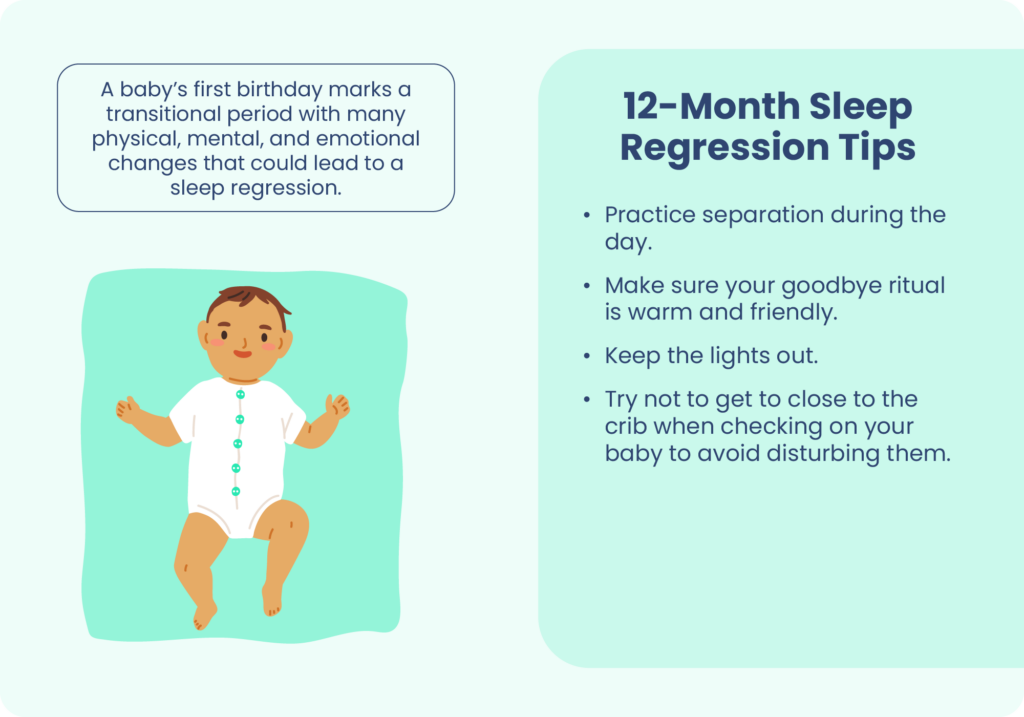
Managing Sleep Problems From Teething
Teething can be an ongoing struggle for parents, especially when it causes fussiness around bedtime. Some strategies to give relief to a teething child include:
- Providing a teething ring or other soft and cool object to chew on
- Massaging the gums with a cool, wet washcloth
When Should Parents Talk With a Doctor About Sleep Problems in a 1-Year-Old?
Questions or concerns about your child’s sleep can always be discussed with your pediatrician at regular check-ups. Most sleep regressions resolve within a few weeks, and may not be cause for concern. Let your child’s pediatrician know if sleeping problems are serious, last for more than a few weeks, or if you notice other changes such as:
- Lack of growth
- Lack of weight gain
- Abnormal breathing or snoring during sleep
- Major changes to habits related to feeding, urination, or bowel movements
Self-Care For Parents and Caregivers
Being a parent or caregiver can be hard, and it is important to remember that no baby’s sleep is perfect. Occasional sleep difficulties are normal and are not a reflection of parents, caregivers, or their children. It is important to set reasonable expectations and ask for help when needed.
Parents and caregivers should also take steps to ensure they are getting enough sleep each night. Getting adequate sleep is an important part of overall health and well-being.

Still have questions? Ask our community!
Join our Sleep Care Community — a trusted hub of sleep health professionals, product specialists, and people just like you. Whether you need expert sleep advice for your insomnia or you’re searching for the perfect mattress, we’ve got you covered. Get personalized guidance from the experts who know sleep best.
References
10 Sources
-
Paruthi, S., Brooks, L. J., D’Ambrosio, C., Hall, W. A., Kotagal, S., Lloyd, R. M., Malow, B. A., Maski, K., Nichols, C., Quan, S. F., Rosen, C. L., Troester, M. M., & Wise, M. S. (2016). Consensus statement of the American Academy of Sleep Medicine on the recommended amount of sleep for healthy children: Methodology and discussion. Journal of Clinical Sleep Medicine, 12(11), 1549–1561.
https://pubmed.ncbi.nlm.nih.gov/27707447/ -
Mindell, J. A., Leichman, E. S., Composto, J., Lee, C., Bhullar, B., & Walters, R. M. (2016). Development of infant and toddler sleep patterns: real-world data from a mobile application. Journal of sleep research, 25(5), 508–516.
https://onlinelibrary.wiley.com/doi/10.1111/jsr.12414 -
Pennestri, M. H., Laganière, C., Bouvette-Turcot, A. A., Pokhvisneva, I., Steiner, M., Meaney, M. J., Gaudreau, H., & Mavan Research Team (2018). Uninterrupted Infant Sleep, Development, and Maternal Mood. Pediatrics, 142(6), e20174330.
https://publications.aap.org/pediatrics/article/142/6/e20174330/37494/Uninterrupted-Infant-Sleep-Development-and -
National Center on Birth Defects and Developmental Disabilities. (2022, December 8). Important milestones: Your child by one rear. Centers for Disease Control and Prevention., Retrieved March 28, 2023, from
https://www.cdc.gov/ncbddd/actearly/milestones/milestones-1yr.html -
A.D.A.M. Medical Encyclopedia. (2020, October 2). Teething. MedlinePlus., Retrieved March 28, 2023, from
https://medlineplus.gov/ency/article/002045.htm -
A.D.A.M. Medical Encyclopedia. (2020, October 2). Bedtime habits for infants and children. MedlinePlus., Retrieved March 28, 2023, from
https://medlineplus.gov/ency/article/002392.htm -
Mindell, J. A., Li, A. M., Sadeh, A., Kwon, R., & Goh, D. Y. (2015). Bedtime routines for young children: A dose-dependent association with sleep outcomes. Sleep, 38(5), 717–722.
https://pubmed.ncbi.nlm.nih.gov/25325483/ -
A.D.A.M. Medical Encyclopedia. (2022, June 7). Separation anxiety in children. MedlinePlus., Retrieved March 28, 2023, from
https://medlineplus.gov/ency/article/001542.htm -
Swanson, W. S. (2015, November 21). How to Ease Your Child’s Separation Anxiety., Retrieved March 28, 2023, from
https://www.healthychildren.org/English/ages-stages/toddler/Pages/Soothing-Your-Childs-Separation-Anxiety.aspx -
American Academy of Pediatrics (AAP). (2013, September 15). Sleeping Through the Night., Retrieved March 28, 2023, from
https://www.healthychildren.org/English/ages-stages/baby/sleep/Pages/Sleeping-Through-the-Night.aspx




